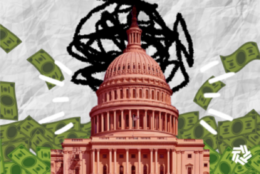Congress
-
On this week's Bloomberg Government Capital Impact show, analysts examine why Congress failed to pass comprehensive cybersecurity legislation last year, and the impact that money had on the 2012 election. January 3, 2012
January 03, 2013 -
Sen. Tom Carper (D-Del.), the chairman of the Senate Homeland Security and Governmental Affairs Committee, and Rep. Darrell Issa (R-Calif.), the chairman of the House Oversight and Government Reform Committee, said they were committed to working together to pass postal reform legislation in the new Congress. Postmaster General Patrick Donahoe renewed his call for congressional action, saying the agency faces an "unsustainable" financial path.
January 03, 2013 -
John Kamensky from the IBM Center for The Business of Government talks about two decades of a results-oriented federal performance management system. Allan Holmes of Bloomberg Government discusses the top technology issues facing the government in 2013. Jeffrey Neal of ICF International sheds light on OPM's new guide to executive development. Jacque Simon of AFGE discusses legislation that could freeze federal pay to the end of the year.
January 03, 2013 -
The bill to avert the "fiscal cliff" reinstates parity between the parking and mass-transit subsidies. The mass-transit subsidy was reduced in 2011 to $125 even as a similar subsidy for parking benefits was increased to $240 a month.
January 02, 2013 -
The House Oversight and Government Reform Committee is consolidating two subcommittees that oversee major agency functions, such as procurement and technology, into a new panel. No news yet on who will be the ranking members.
January 02, 2013 -
Brian Friel of Bloomberg Government told The Federal Drive with Tom Temin and Emily Kopp Congress' latest piece of legislation both delays sequestration and reduces its potential effect.
January 02, 2013 -
William R. Dougan, national president of the National Federation of Federal Employees, said Tuesday the Senate's fiscal cliff bill will lead to a political standoff that will leave federal employees with an uncertain future.
January 01, 2013 -
Highlights of a bill approved Tuesday by the Senate aimed at averting wide tax increases and budget cuts scheduled to take effect in the new year.
January 01, 2013 -
While Darrell Issa, chairman of the House Oversight and Government Reform Committee, criticized the Obama administration for turning in the Unified Agenda nine months late, one researcher says its more important to focus on the contents of the document rather than the timing of its release.
December 31, 2012 -
Benefits expert and federal career specialist John Grobe, offers advice on how to get a job in the federal government. December 26, 2012
December 26, 2012 -
For years, politicians from both parties have threatened to trim federal benefits, like retirement and health insurance, but nothing has happened. In today's guest column, Senior Correspondent Mike Causey asks benefits expert John Grobe to talk about the history and future of federal benefits.
December 26, 2012 -
Congress has cleared the way for a $633 billion defense policy bill that includes mandated reductions to the Defense Department's civilian and contractor workforces. Leaders of a House-Senate conference committee, tasked with reconciling competing versions of the 2013 National Defense Authorization Act, included in the final report the automatic workforce reductions that opponents say would result in about 36,000 job losses.
December 19, 2012 -
Defense analyst Jim McAleese reviews the Defense Authorization Bill agreed on by both the Senate and the House yesterday. OPM Director John Berry says proposed rules to implement phased retirement are on the fast track. Rep. John Sarbanes (D-Md.) discusses changes that will make it easier for feds to telework. Rep. Gerry Connolly (D-Va.) talks about benefits that will help retain federal employees. Vivian Reifberg of McKinsey & Co. talks about why the current administrative transition is so important. Alex Bolton of The Hill discusses the fiscal cliff negotiations.
December 19, 2012 -
Director John Berry said the agency's Innovation Lab is helping to take a different, more rapid approach to developing the proposed rule to implement the new program. Rep. Gerry Connolly (D-Va.) also is suggesting the creation of a "leave bank" for workers who leave federal service but plan to return. Berry said that's an innovative idea OPM may look at.
December 19, 2012 -
In the fiscal-cliff talks, it now appears that both sides have blinked. Republicans appear willing to accept some higher taxes and Democrats seem to have agreed that Social Security's growing costs must be curtailed. Slightly and slowly. So how will the proposals affect you? Check out Senior Correspondent Mike Causey's column.
December 19, 2012



